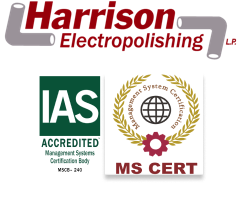- Home
- Industries Served
- Biotech
Electropolishing Biotech Equipment
Electropolishing produces a microscopically featureless surface which is ideal for the biotech industry. An electropolished surface is non-particulating, less reactive and more easily sanitized. An electropolished surface will reduce product adhesion and will reduce the formation of some bacterial biofilms.
The biotech industry has an established guideline for its surface finish requirements detailed in the ASME BPE (The American Society of Mechanical Engineers - Bioprocessing Equipment) specification. This specification includes surface finishes which may be used when specifying surface finishes. The following table summarizes the information provided within ASME BPE for the interior surface finishes of bioprocessing equipment and distribution system components.
| Ra Readings for Surfaces | ||
| Mechanically Polished | ||
|---|---|---|
|
Surface Designation |
Ra Max |
|
|
µ-in |
µm |
|
|
SF1 |
20 |
0.51 |
|
SF2 |
25 |
0.64 |
|
SF3 |
30 |
0.0756 |
| Mechanically Polished and Electropolished | ||
|
Surface Designation |
Ra Max |
|
|
µ-in |
µm |
|
|
SF4 |
15 |
0.38 |
|
SF5 |
20 |
0.51 |
|
SF6 |
25 |
0.64 |
Harrison Electropolishing has long been a part of the efforts by ASME and other professional industry organizations, to standardize the expectations and designations of acceptable surface finishes. Tom Harrison, our company president, is a member of ASME and is currently part of the surface finish subcommittee for ASME BPE. Tom has also served as a board member for ISPE (International Society of Pharmaceutical Engineering).
Contact our offices today to discuss about electropolishing and passivation services for the biotech industry.
INDUSTRY STANDARDS
-
ASME BPE
-
ASTM G93

